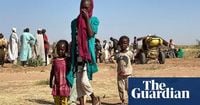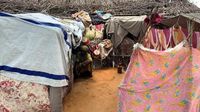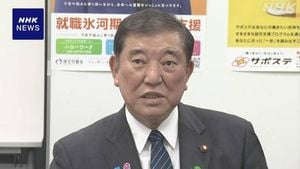Sudanese paramilitary forces have killed more than 200 civilians in a series of brutal attacks on displacement camps and surrounding areas near El Fasher, the last major city in the Darfur region still under the control of the Sudanese army. The Rapid Support Forces (RSF) were responsible for at least 56 of these deaths following two days of assaults on Um Kadadah, a town seized on the way to El Fasher. This wave of violence marks the worst bloodshed in Darfur since the outbreak of civil conflict between the army and paramilitary forces more than two years ago.
According to the United Nations, killings have occurred in two major displacement camps, including Zamzam, where the entire medical team of Relief International — the only organization still operating a clinic there — was reportedly killed. RSF troops are believed to have begun torching structures in Zamzam on Sunday, April 13, 2025, claiming they were searching for Sudanese government fighters hiding among civilians.
The United States has condemned both sides in the conflict, accusing the RSF of genocide in Darfur and the Sudanese army of attacking civilians. The ongoing fighting has effectively split Sudan in two, with the army controlling the north and east, while the RSF dominates much of Darfur and parts of the south. The conflict has resulted in tens of thousands of deaths and displaced over 12 million people, creating what the International Rescue Committee has described as “the largest humanitarian crisis ever recorded.”
The recent massacres have increased pressure on UK Foreign Secretary David Lammy to issue a decisive response regarding the protection of civilians when he convenes a ministerial summit on Sudan in London on Tuesday, April 15, 2025. This summit will include representatives from 20 countries and organizations, highlighting the urgency of the situation.
The violence has centered around the Zamzam camp, which, along with the nearby Abu Shouk camp, is home to approximately 700,000 people displaced by the ongoing war. Aid agencies report that shelters, markets, and healthcare facilities have been destroyed in the RSF's attacks. The RSF claimed that the camp was being used as a base by so-called “mercenary factions,” but humanitarian organizations condemned the assault as a deliberate attack on vulnerable civilians, including women, children, and the elderly, who are already suffering from famine.
The Sudan Liberation Army (SLA), a militia aligned with the national army, has been engaged in fighting the RSF near al-Fashir, about 15 kilometers (9.3 miles) from Zamzam. Tens of thousands of camp residents have fled to al-Fashir on foot, overwhelming local shelters. Many are now sleeping outdoors without access to food, water, or medicine, according to SLA spokesperson El-Sadiq Ali El-Nour. The city, which is the capital of Sudan’s North Darfur province, came under intense shelling and RSF ground assaults on Sunday, April 13, 2025, prompting the SLA to call for urgent military support from Sudan’s armed forces and allied groups.
The Sudanese army maintains a base with several thousand troops in al-Fashir. The SLA stated, “The leadership of the armed forces must act swiftly to save the lives of approximately 1.5 million people in al-Fashir. Darfur must not fight alone.” Meanwhile, the RSF has denied targeting civilians and, on Saturday, accused its opponents of fabricating media reports with actors and staged scenes to incriminate them. On Sunday, the RSF claimed it had facilitated voluntary evacuations for families fleeing al-Fashir and nearby camps, welcoming the presence of humanitarian agencies to respond to the worsening conditions.
Sudan’s civil war erupted in April 2023, triggered by a power struggle between the army and the RSF, crushing hopes for a transition to civilian governance. The conflict has since displaced millions and devastated entire regions, particularly Darfur, where the RSF is now fighting to hold its strongholds against the army’s advances from Khartoum.
As the situation continues to deteriorate, calls for international intervention grow louder. Kate Ferguson, co-director of Protection Approaches, expressed concern about the escalation of violence against civilians, stating, “It appears that the RSF is attacking Zamzam, Abu Shouk, and El Fasher simultaneously for the first time, including a ground assault on Zamzam. This is a significant escalation in violence against civilians in the North Darfur region and requires immediate diplomatic response.”
Ferguson emphasized the need for a collective international response, stating, “This means sincerely confronting those backing and enabling atrocity crimes, and establishing a serious senior coalition willing to advance at pace the political and technical solutions necessary to halt genocide, crimes against humanity, war, and famine.”
As the summit approaches, the international community watches closely, hoping for a decisive action plan to protect civilians and address the humanitarian crisis unfolding in Sudan. The situation remains dire, with the potential for further escalation looming as the RSF seeks to consolidate its control amidst the chaos.





